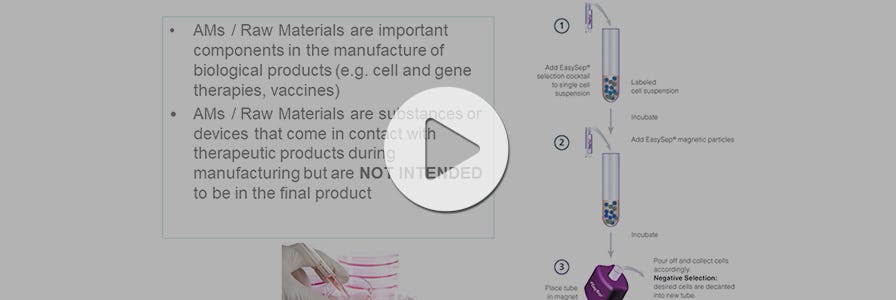Our Approach to Quality, Regulatory and Compliance
What It Means to Us and for You

At STEMCELL Technologies, we invest in quality to achieve our goal of advancing scientific knowledge by enabling research. To ensure that we always meet the highest quality standards, we operate a quality management system (QMS) in compliance with relevant and current regulatory requirements and continuously work to improve our QMS, products, and services.
Explore below to learn more about our approach and commitment to quality and how we can support your regulatory and compliance needs.
Why Is Quality Important?
Quality affects everything: product performance and user satisfaction, compliance with regulatory requirements and applicable standards, and how we operate as a company. Identifying the different quality needs that you—the scientists using our products—and the relevant regulatory authorities may have is important for designing solutions that meet these requirements and ensuring the reproducibility, integrity, and impact of your work.
At STEMCELL, quality drives everything we do. As one of our core company values, it is an ingrained part of our culture.
Our approach to quality is based on the following principles:
- Quality means understanding and exceeding your expectations of our products and services
- Quality is measurable and transparent
- Quality requires continuous improvement
- Quality is integrated into the entire product management life cycle
- Quality begins at top management
Our Quality Policy
We are committed to:
- Superior product quality and customer service driven by continuous improvement, customer satisfaction, and innovative scientific research.
- Compliance with applicable regulatory requirements and maintaining an effective quality management system.

Our Quality Management System
A quality management system (QMS) is a formal system of processes, procedures, and responsibilities for achieving quality policies and objectives. It helps coordinate and direct activities to meet customer and regulatory requirements, drives continuous improvement, and contributes to efforts to enhance customer satisfaction.
STEMCELL’s QMS is certified to ISO 13485:2016 Medical Devices and ISO 9001:2015. These international standards developed by the independent, non-governmental International Organization for Standardization (ISO) define the requirements for operating a QMS for the design and manufacture of medical devices and related services. Certification verifies that these standards are met by evaluating inputs and outputs throughout the entire product life cycle, from design and production to assessing customer satisfaction and informing necessary improvements.
For more information on these ISO certifications and to download the certificates, please refer to our Regulatory Support Page.
Our ISO 13485- and ISO 9001-certified Quality Management System encompasses critical areas, such as:
- Training staff to effectively support all customer scientific and service needs.
- Qualifying, calibrating, and maintaining equipment used to design, manufacture, and test products.
- Maintaining a stringent supplier qualification, selection, and management process.
- Requiring comprehensive traceability of components and products.
- Running a Corrective and Preventive Action (CAPA) Program.
- Performing regular internal audits of all critical processes.
How Does Our Approach to Quality Affect You?
Simply put, we will work with you to ensure that your specific requirements are met, whether they be performance or regulatory. As a team of Scientists Helping Scientists, our purpose is to help researchers and organizations maximize their innovative potential.
We are committed to exceeding your expectations with superior product performance and safety as well as personalized customer service. Your satisfaction is also prioritized in our process-oriented approach to continuous improvement, scientific innovation, and regulatory compliance.
What You Can Expect from Us:
- The benefits of over 25 years of experience as a global leader in manufacturing quality reagents and cutting-edge research tools, including an understanding of the global regulatory landscape and how it impacts your workflow.
- Products and services that are safe and effective for their intended use and that reliably meet your specifications and requirements.
- Products and services that are designed, manufactured, marketed, and distributed in compliance with relevant laws, regulations, standards, and our QMS.
- Personalized scientific support tailored to your needs, from questions on our off-the-shelf solutions to requests for higher compliance product manufacture or custom products.
- Resources to help you meet your requirements for regulatory compliance.
- Evaluation and mitigation of foreseeable risks associated with the use of our products.
- Definition, planning, and documentation of all activities affecting quality.
Quality and Regulatory Compliance
When discussing product quality, it is important to consider the difference between product performance and regulatory compliance. Though often conflated, they are not equivalent. A common misconception, for example, is that compliance with Good Manufacturing Practices (GMP) is absolutely necessary to meet regulatory requirements and guarantees product performance in your research or manufacturing workflow.
Regardless of a product's compliance claim, it is important to work closely with your supplier and regulators to ensure that the material you choose can support your needs from both the performance and compliance standpoints. This is particularly important when selecting and qualifying ancillary materials (AMs; also referred to as raw materials) used to manufacture cell therapy products, for which definitive regulations are still lacking.
Qualification of Ancillary/Raw Materials for Clinical Use
Walk through the steps required to qualify ancillary/raw materials for clinical use in this ISCT-hosted webinar with Lynn Csontos, STEMCELL’s Director of Quality Affairs.
The Impact of Ancillary Materials on Your Translational Research
Learn how ancillary materials impact preclinical and clinical research and why regulatory standards should be considered to ensure quality and safety.
As researchers increasingly move into the translational space for cellular therapies, STEMCELL is dedicated to easing the transition by supporting their continued use of our products. To support the changing needs of the field, we are also committed to expanding our catalog of products manufactured in our growing GMP program.
STEMCELL may be able to support the use of our products as AMs even without GMP by following the qualification framework outlined in Chapter <1043> of the United States Pharmacopeia (USP).1 Our Services for Cell Therapy team is available to work with you to define your specific quality requirements and design a solution that best fits your needs.
For answers to frequently asked questions on qualifying AMs for cell therapy manufacturing and to learn how we can work with you, explore our Regulatory Support page. You can also contact us or your local representative to discuss your specific regulatory or product requirements.
Support for Your Regulatory and Compliance Needs
Explore this resource page to learn about qualifying AMs for cell therapy manufacturing, our custom Services for Cell Therapy Program, and how to access relevant documentation.
How We Maximize Quality and Minimize Risk
In today’s ever-changing economic and regulatory climate, STEMCELL strives to mitigate risks to our business AND to you. We make it a priority to consider our projects, products, and processes through a risk management lens.
Our goal and commitment to you is to ensure an uninterrupted supply of our products. By investing in a risk management program, we are increasing our ability to prevent supply disruptions and rapidly respond to unexpected risks.
Key elements of our Risk Management Program include:
- An effective Risk Communication Program that creates awareness of risks across internal business units and management tiers. This enables us to get ahead of and mitigate risk using a unified, priority-based strategy.
- A Supplier Management Program to ensure our suppliers meet both STEMCELL’s quality standards and business requirements.
- A robust New Product Introduction process designed to ensure supply continuity throughout the product life cycle.
- Risk Management Files for critical products following ISO 14971 Medical Devices.
- An automated inventory management system to proactively maintain healthy inventory levels and product availability for our customers.
- Customer- and supplier-facing relationship management programs to ensure open communication lines and rapid risk mitigation.
Minimizing risk involves continual improvement. Moving forward, we are building upon our existing risk management framework to monitor and reduce risk by expanding our consideration of supplier social and environmental practices, geopolitical exposure, and performance.
Product Life Cycle Management
By adopting and maintaining a robust and accountable process to move products from development and manufacturing to post-launch customer support, we consistently and reliably deliver products of the highest quality. Our focus is on standardization, and our customers have come to expect our products to perform to the highest standards, with extremely low bottle-to-bottle or batch-to-batch variability in performance.
Our product management lifecycle includes the following formal stages:
- Defining design and test requirements
- Prototyping or pilot-batch manufacturing
- Intensive quality control testing
- Scale-up
- Production
- Stability testing
- Post-launch customer feedback
Related Resources
Explore these additional pages to learn more about qualifying ancillary materials, our Services for Cell Therapy Program, and product-specific quality information.
Support for Your Regulatory Needs
Learn how we work with you to meet your compliance requirements.
References
- General Chapter <1043> Ancillary materials for cell, gene, and tissue engineered products. (2017) In: The United States Pharmacopeia.



